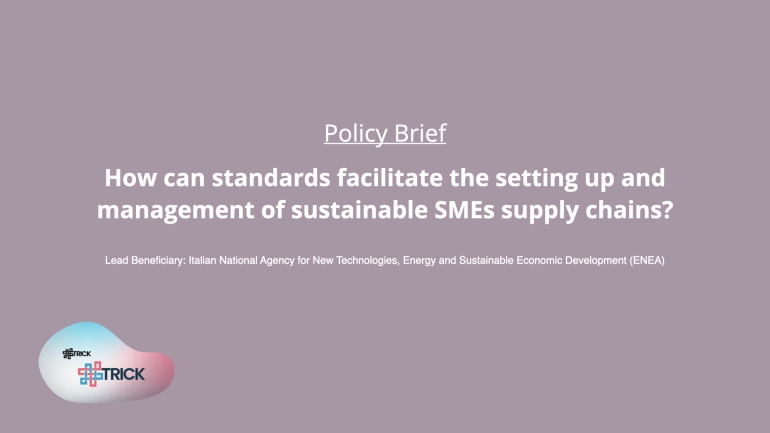How can standards facilitate the setting up and management of sustainable SMEs supply chains?

The TRICK project aims to play an important role in the framework of designing and characterizing the textile & clothing (TC) supply chains of the future. Its objective, besides supporting the transition from linear to circular, enhancing the transparency of SMEs’ business processes and the traceability of their products as well as providing secured and reliable data, is also to assist companies in their relationships with regulatory entities, like Custom Agencies. Ultimately being a key to new approaches for products and data management within the TC sector.
In the fragmented and continuously evolving supply chains supported by the TRICK project, the most relevant challenge is the creation of a common understanding, using as many as possible existing standards, even if incomplete, to facilitate replication and diffusion of the project's results among SMEs.
The policy brief How can standards facilitate the setting up and management of sustainable SMEs supply chains? shows an overview of the policy implications resulting from the written report: “Harmonized set of semantic standards, ontologies, nomenclatures” (D1.4). Its main objective was the definition of the reference framework for TRICK platform activities: on one side the definition of the technical and semantic reference for information exchanges along the supply chains; on the other side the preliminary study for managing effective and efficient PEF (Product Environmental Footprint) evaluations on the supported final products. The final outcome is a framework based on UNECE methodology for transparent and sustainable supply chains¹, CEN CWA eBIZ specifications for data exchange², PEF Category Rules (PEFCR) for apparel products³ and a number of other standards and nomenclatures to be used as a reference in the TRICK platform. Finally, the original contribution from the TRICK project will complement such a framework.
Interesting potential implications and contributions to policies have arisen, with some tangible inputs for policymakers and stakeholders on different topics.
The adoption of the guidelines of the UNECE project “Enhancing Traceability and Transparency for Sustainable Value Chains in the Garment and Footwear Sector”⁴, as the main reference that TRICK has assumed to model the traceability data collection along the TC supply chains, will be the starting point to a relevant contribution on this topic. They will be implemented on real supply chains also for the Food sector, with the chance to collect and report to UNECE’s expert group comments and suggestions on its suitability for replication with a focus on the applicability of circularity.
A new model of collaboration with Custom Agencies will be defined and implemented within the Preferential Certificate of Origin (PCO) service that will be available on the TRICK marketplace. Given the collaboration with the Italian Customs Agency, a partner of the TRICK project, it will be possible to report to the European level through the common tables of discussion between the national agencies and the DG TAXUD, the results of a real pilot implementation of this new collaborative model to support the PCO management for companies. Issues like interoperability between systems and the use of the blockchain to ensure transparency of the supply chain's processes and faithfulness of information will be faced.
A further important implication is the one related to the wider adoption and improvements of semantic standards and specifications. One of the objectives of the TRICK project is to improve the digitalisation of business processes in the TC and Food supply chains, through the adoption and use of reference standards. The TRICK project will contribute to the eBIZ specification development, be presented to EURATEX (that is managing the specifications) and in case to CEN, the European Committee for Standardization, but it might also concur with the UN/CEFAT outcomes under experimentation.
Finally, the preliminary analysis carried out on the draft PEFCR for textile products has highlighted the potential contribution by TRICK to the work of standardization for applying PEF in the TC sector, being managed by a team that is led by SAC (Sustainable Apparel Coalition⁵) on behalf of the European Commission, basically on two aspects:
- The applicability of their contents, with comments and concrete use cases
- The development and completion of the PEFCR, presenting meaningful input from the PEF service implementation and pilots’ activities and results.
The complete version of the policy brief can be downloaded and read on the project’s official website in the ‘Project Document’ Section under ‘Papers’ here.
CONTACT PERSON & EMAIL ADDRESS
LINKS
- ENEA (Website)
REFERENCES
- UNECE (Link)
- eBIZ (Link)
- Quantis and Sustainable Apparel Coalition, 2021. Draft Product Environmental Footprint Category 4 Rules (PEFCR) Apparel And Footwear.
- UNECE (Link)
- Apparel Coalition (Link)